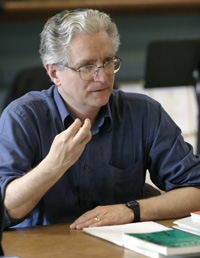“The interesting thing about many short stories is that they are wonderful live performance texts,” said Kurt Beattie, artistic director for Seattle’s A Contemporary Theatre. ACT, in conjunction with Town Hall Seattle, will perform dramatic readings of short stories by Jewish American authors on Sun., Sept. 12 at Town Hall.
“Short Stories Live: The Jewish Imagination” was inspired by New York’s Symphony Space program, “Selected Shorts: A Celebration of the Short Story.” Former Town Hall executive director David Brewster created the Seattle-based event. Upon his departure, he asked Beattie to be curator, and Wier Harman took over for Brewster at Town Hall
For Beattie, this seemed like a natural collaboration.
“We have reconceived ACT in theatrical terms,” he said. “The point of our existence is to create consciousness.”
The concept of the performance derives from a fear that short stories are becoming an endangered literary species.
“It’s going out of style,” Beattie said. “This program came about as a love for them.”
Choosing Jewish American short stories emerged as an obvious choice.
“There is such a tremendous contribution of writers with Jewish heritage,” Beattie said. The production will feature three works by influential Jewish writers: Saul Bellow’s “Looking for Mr. Green,” JD Salinger’s “Laughing Man” and Woody Allen’s “Hassidic Tales, With a Guide to their Interpretation by the Noted Scholar.” The stories will be dramatically read by actors Beattie, Frank Corrado and Chris Ensweiler.
The pieces were mainly chosen as a result of their authors’ influence on the literary landscape, their artistic quality and themes.
“Salinger and Bellow are foundational writers,” said Beattie. “Why not start with them?”
In the future, he would like to see stories come from different viewpoints in the Jewish American world, particularly from younger generations and from women. For now, Bellow, Salinger and Allen not only have the name recognition, but their stories are also historically and culturally important. The “cultural obligation is to remember,” Beattie added. “That’s one reason for starting with the older writers. If you don’t keep it in front of the public, it disappears…and what it has to teach us goes away.”
The stories are different enough to provide variety, but their themes of personal, spiritual, and moral quests complement one another.
“Much of short story writing is about mortality, it’s about dysfunction,” Beattie said. “We all need redemption, and we all need to be entertained from time to time.”
In Bellow’s Depression-era “Looking for Mr. Green,” a white government employee’s search for a poor, crippled black man asks questions of not only race and identity, but also of the value of spiritual pursuit. On the other hand, Salinger’s postwar “Laughing Man” depicts a child’s dim revelation about American grown-ups through an obsession with a grotesque fairytale. Finally, Woody Allen characteristically steps in for the last laugh with uncomfortable parodies of Hassidic tales.
Bellow’s and Salinger’s stories do not center around Jewish issues. Moreover, Bellow hated to be called a “Jewish writer” and Salinger barely ever identified as a Jew, which begs the question: What makes stories Jewish, and what makes writers Jewish writers, especially when Judaism itself is so hard to define?
Beattie defends the production’s choices.
“There are writers of Jewish origin who hate the idea of being identified as “˜Jewish’ writers,’” he said. However, “the mind has to have categories in order to understand the world…it’s not about how the writers would define themselves. It’s just the fact of it.”
Furthermore, he added that American culture defines each writer’s Jewish nature. The gap between American culture and ancient Judaism “creates huge ambivalences…and acute intellectual inquiry.” According to Beattie, the Jewish voice of “Looking for Mr. Green” asks, “I came from somewhere else…am I really here? Do I belong here? How do I know somebody else?”
Regarding Salinger, Beattie said, “Now it’s the nuclear world. It’s the world of aggressively materialistic America that is lacking a kind of spiritual compass, and the Glass family and the whole range of people that come into his stories are people who are in one way or another outsiders, who are aware of this vacuity.”
Allen, said Beattie, is the “crystallization of mordent Jewish humor that is authentically — could only be — American and Jewish.” He added, hesitatingly, that underneath Allen’s comedy there is a moral conversation going on.
“The responsibility to live a moral life is at the heart of Woody Allen,” he said. “There has to be a higher authority to which we appeal…but are we living under absurd conditions that come to us from the past?”
Overall, Beattie sees Allen’s stories as good old comic relief. “They’re kind of celebratory, too. They’re fun. They’re just goofy.”
When a Jewish-centered production like “Short Stories Live” reaches the greater population, many people will, inevitably, ask: “Is it good for the Jews?”
Beattie believes that modern Jewish viewers may relate to the characters.
“You’re out there, existentially, on a limb, and you have to make a decision about how to deal with it,” he responded. “And an aptitude for philosophy is a tradition in Jewish intellectual life.”
By performing short stories by Jewish-born writers, the production attempts to keep both the genre and the culture alive. The short stories contain a dramatic context well suited to the stage. Beattie’s passion for the project is evident.
“I am delighted by the fact that they leap off the page,” he said. “It’s quite extraordinary.”
Entertainment, redemption
